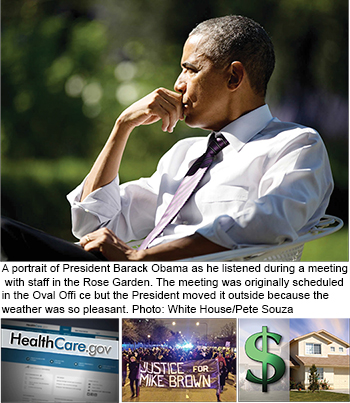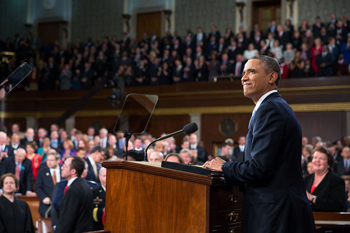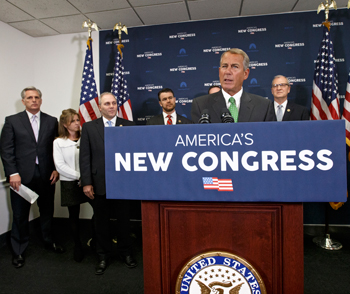America under Obama: The best of times and the worst of times
By Askia Muhammad -Senior Editor- | Last updated: Jan 20, 2015 - 11:04:31 AMWhat's your opinion on this article?

|
“It was the best of times, it was the worst of times, it was the age of wisdom, it was the age of foolishness, it was the epoch of belief, it was the epoch of incredulity, it was the season of Light, it was the season of Darkness…” the novel, written in 1859 begins.
“The good news is that in 2014 people were increasingly finding jobs. The bad news is that we are still digging our way out of the recession, and wage growth remains stagnant and untouched by recovery,” Elise Gould, Senior Economist with the Economic Policy Institute said of the U.S. economy, in a statement released by the National Urban League.
“It is what Dickens wrote,” veteran political analyst and statistician Dr. David Bositis told The Final Call; “it was the best of times, it was the worst of times. Things are improving in terms of the economy, still not good, but they’re improving, but in terms of race, the degree and the obviousness of racism in the country has never been so stark in the past…oh you have to go back to (President) Reagan, in the early years of Reagan actually, when the right-wing nuts were feeling frisky.
“In the ‘90s, the manifestation of the kind of racism—not just in terms of what people say, and what people obviously think, conservatives mostly—but also the policies in terms of doing nothing to try to stimulate the economy and improve things for communities of color who are having economic problems; what we’ve seen in terms of police, it’s always been there.
“And then the connection between, it’s always been there in terms of gaming election laws so that people of color the kind of representation that they’re supposed to get. Not just in terms of gerrymandering districts, but having elections—like in St. Louis—having elections in April of odd-numbered years. Now that’s a place where African Americans are a clear majority, but on Election Day for municipal elections, they’re a minority. There’s that kind of stuff,” Dr. Bositis continued.

President Barack Obama acknowledges applause before he delivers the State of the Union address in the House Chamber at the U.S. Capitol in Washington, D.C., Jan. 28, 2014. Photo: White House/Pete Souza
Despite the even stiffer opposition Mr. Obama is expected to receive from even more recalcitrant Republican majorities in both houses of Congress during his final two years in office, the President’s approval rating is back up to 46 percent to start the new year, after dropping to record lows in 2014, according to a CBS News poll released Jan. 14. |
Life imitates art
Despite the even stiffer opposition Mr. Obama is expected to receive from even more recalcitrant Republican majorities in both houses of Congress during his final two years in office, the President’s approval rating is back up to 46 percent to start the new year, after dropping to record lows in 2014, according to a CBS News poll released Jan. 14.
The best of times
After six full years as president, Mr. Obama is now upbeat about his prospects for leading a badly divided government. During a national tour to promote the themes he will emphasize in his SOTU to be delivered to a joint session of Congress on Jan. 20, ahead of his final two years in office, he was confident at a Ford Motors plant in Wayne, Michigan. “My presidency is entering the fourth quarter. Interesting stuff happens in the fourth quarter,” Mr. Obama said this in early January when he launched his “SOTU Spoiler Tour.”
Mr. Obama is promising to make the best of the situation in which he finds himself and the country. Some of his announcements will be executive actions, and others will be legislative proposals. And despite what might be said by the Washington Beltway pundits, the President is looking forward to working with the new Republican Congress on ways to move the country forward, his office said.
And there is no shortage of non-governmental forces prodding the president on behalf of their causes.
A Care2 petition has been signed by more than 45,000 people in this country and around the world in support of the Congressional Black Caucus’ proposal to have President Obama invite the families of victims of high-profile cases of police brutality—Michael Brown, Eric Garner, and Tamir Rice in particular—to the State of the Union address.
“Federal data shows that young Black men are 21 times more likely to be shot by police than are young White men,” the Care2 petition reads. “As civil rights hero Rep. John Lewis said, inviting these families to attend the State of the Union ‘would help educate and sensitize other members (of Congress) and humanize some of the issues that we’re going to confront’.”
But the president’s guests have been chosen from among people who have written him in the past year to share their personal situations. Typically, the White House invites people whose personal stories illustrate themes in the president’s speech. They sit with the first lady.

House Speaker John Boehner of Ohio speaks to reporters following a House GOP caucus meeting on Capitol Hill in Washington, Jan. 7. From left are, House Majority Leader Kevin McCarthy of Calif., Rep. Lynn Jenkins, R-Kansas, House Majority Whip Steve Scalise of La., Rep. Todd Young, R-Ind., Boehner, and Rep. Kevin Cramer, R-N.D. Photo: AP/Wide World photos
Republicans have attacked the president for using executive authority and regulatory interpretations to shield immigrants from deportation and to impose new climate rules on power plants. Critics say the president is abusing the power of his office. |
In his weekly Internet address Mr. Obama did not acknowledge the CBC petition, instead he announced that Carolyn Reed of Colorado, who recently expanded her sandwich shop chain thanks to a Small Business Administration loan, and raised wages for her hourly employees would be a guest; and that Victor Fugate of Missouri, who is now able to pay his student loans because of a new program capping monthly payments; and Jason Gibson of Ohio, who wrote the president to say that after losing both legs in Afghanistan, he’s making progress and has a new daughter; and finally Dallas resident Ana Zamora, who was brought to the U.S. illegally as a child, but benefited from Mr. Obama’s program to defer deportations for eligible immigrants would be his other guests. Ms. Zamora’s parents will now be eligible for protection from deportation under the president’s recent executive actions on immigration.
Advocates for statehood for the District of Columbia—whose residents pay taxes, fight in this country’s wars, but have no voting representation in the House or the Senate—are calling on the President to voice support for their cause during his address. Neighbors United for DC Statehood; insist that even a brief mention by Mr. Obama during address would give their grassroots effort a big boost.
“We can be active, engaged, and protest and advocate and lobby all we want on Capitol Hill, but we need the citizens of the 50 states to do the same on our behalf,” Josh Burch, head of the group said in a statement. “Because the only way this is gonna happen, (is) if members of the House and Senate act on it.” President Obama spoke out in favor of D.C. statehood in 2014 during a question and answer session at an elementary school in Washington. Unlike his predecessor, he has also ordered vehicles in his motorcade to use the D.C. license plates that have the motto “taxation without representation” on them. The phrase is a reference to the U.S. colonial slogan, which now refers to D.C.’s lack of autonomy from Congress.
The President should take an executive action announcing that he will expand overtime eligibility former Labor Secretary Robert Reich advised in a social media post on Jan. 17. “Over the last 40 years, the number of workers eligible for overtime pay has dropped dramatically,” Mr. Reich said. “In 1975, more than 65 percent of salaried workers earned overtime pay. Today, only 11 percent do. Now, workers who earn more than $23,660 a year can be made to work overtime hours for no additional pay at all.
“To restore overtime eligibility to the same percentage of workers as in 1975, the Department of Labor should raise the overtime threshold to $69,000. So if you earn $69,000 or less, the law would require that you be paid time-and-a-half for every hour worked over 40 hours a week. If this were the rule, 10.4 million middle-class Americans would get a raise. If corporate America didn’t want to pay time and a half, it would have to hire hundreds of thousands of additional workers to pick up the slack,” Mr. Reich said.
In his Wayne, Michigan speech leading up to the SOTU address, Mr. Obama said that “America’s resurgence is real.” In December 2008, one month before Mr. Obama took office; the Pew Research Center asked people whether they were hearing mostly good news about the economy, mostly bad news, or a mix of good and bad.
In those days after the financial crash, only 1 percent said they were hearing mostly good news, a huge 80 percent said they heard mostly bad news, and another 19 percent said reports they were hearing about the economy were mixed.
In December 2014, the picture was much improved. According to Pew, 14 percent put themselves in the most optimistic category (mostly good news). Just two in ten (21 percent) said they were hearing mostly bad news, while 63 percent reported hearing a mix of both.
“Plants like this one built more than cars. They built the middle class in this country, and that was worth fighting for,” Mr. Obama told a crowd of autoworkers at the Michigan Ford plant. “Saving the American auto industry was the right thing to do. Betting on you was the right thing to do. We’re making more stuff, we’re selling it around the world,” he said.
Six years into his term of office, Mr. Obama noted, the American auto industry has roared back to life. Since mid-2009, they’ve added more than 500,000 jobs. Last year, American autoworkers built cars faster than any year since 2005. Not to mention they’ve repaid taxpayers every dime and more of what the Obama administration committed to them, he said.
In another pre-SOTU speech, in Phoenix, the President took stock of the housing market. In 2009, the housing market was in a freefall, the White House said. “Thanks in part to President Obama’s swift intervention when he took office; our housing market is on much firmer footing. Rising home values have helped millions of families who were underwater on their mortgages, and new foreclosures are at their lowest levels since 2006,” the statement said.
“Still, homeownership is out of reach for too many Americans — families who can afford to buy a home, but find themselves shut out because the lending market is too tight. That’s why the President will announce a new executive action that will help more responsible Americans own a home, building on efforts already underway to cut red tape that holds them back.”
In Knoxville, Tennessee, Mr. Obama announced new ways to help more young people go to college, proposing that students be able to attend a community college—essentially the first two years of a bachelor’s degree program—tuition free, almost like an extension of high school for students who maintained a minimum grade-point average.
He also announced a new manufacturing innovation hub — a private-sector partnership intended to attract middle-class jobs in high-tech manufacturing to Tennessee.
“We’ve created nearly 11 million jobs over the past 57 months — the longest streak of private-sector job growth on record. 2014 was our strongest year of job growth since the ‘90s,” the White House said in a statement about the Tennessee appearance.
“In the last year alone, about 10 million Americans have gained health insurance thanks to the Affordable Care Act. Drivers are saving more than a dollar a gallon at the pump relative to this time last year. We’ve seen the wars in Iraq and Afghanistan come to a responsible end, and more of our troops are coming home to their families.”
White House officials said the president would challenge Republicans to pass bills that he could sign. But aides said Mr. Obama speeches in Phoenix and Knoxville, Tenn., were examples of how the President intended to continue his recent practice of using the executive powers of the presidency to advance his agenda.
Republicans have attacked the president for using executive authority and regulatory interpretations to shield immigrants from deportation and to impose new climate rules on power plants. Critics say the president is abusing the power of his office.
“In terms of the world as a whole, there are lots of nuts—religious nuts—running around. I’m not just talking about Islamic terrorists and crazy people, but Christian religious nuts, Hindu religious nuts, I mean there are all sorts of religious nuts, people who feel they can do whatever they want in terms of their beliefs,” said Dr. Bositis.
“It looks like, due to (Mr.) Obama’s leadership that the United States and Iran have the potential to come to some kind of an understanding. The thing with Cuba is great, long, long, 50 years overdue. There are some good things happening.
Mr. Obama’s governance has benefited largely from the policies he put into place the first two years he was in office, according to Dr. Bositis. “Since then, the Republicans and the conservatives have had a strong policy of damaging the economy. In 2010, when the Republicans took over all these state governments throughout the country, they fired tens of thousands of people, which of course pressed the economy even more.
“So Obama’s right, the things that he did in his first two years in office, and the things that he tried to coax the Republicans into doing later on, would have helped the economy improve. He did it where the other side was looking to destroy the economy if they could,” Dr. Bositis pointed out.
But the area of racial injustice remains the national Achilles Heel. Racialized police brutality was elevated to the forefront of Americans’ minds following the August 2014 shooting death of unarmed 18-year-old Michael Brown in Ferguson, Mo. A grand jury failed to charge the officer who killed him with any crime.
The issue gained further attention when a grand jury failed to indict the officer who killed Eric Garner, another Black man, who this time was filmed in Staten Island, N.Y. being placed in a chokehold by an officer who was in fact banned by New York Police Department. The Garner death followed a verbal confrontation in which he was accused of selling untaxed cigarettes. Garner died despite telling officers “I can’t breathe” 11 separate times.
In November, 12-year-old Tamir Rice was shot and killed by a rookie police officer less than three seconds after the officer arrived at the scene, where Rice was playing with a toy gun. Those incidents set off a summer and autumn of protests organized around the theme “Black Lives Matter,” and specifically articulating “Hands Up. Don’t Shoot” the posture eyewitnesses claim Michael Brown assumed before he was gunned down by six bullets fired by White Ferguson, Mo. police officer Darren Wilson.
Charles Dickens wrote in his “Tale of Two Cities:” “…it was the spring of hope, it was the winter of despair, we had everything before us, we had nothing before us, we were all going direct to Heaven, we were all going direct the other way - in short, the period was so far like the present period, that some of its noisiest authorities insisted on its being received, for good or for evil, in the superlative degree of comparison only.”
INSIDE STORIES AND REVIEWS
-
-
About Harriett ... and the Negro Hollywood Road Show
By Rabiah Muhammad, Guest Columnist » Full Story -
Skepticism greets Jay-Z, NFL talk of inspiring change
By Bryan 18X Crawford and Richard B. Muhammad The Final Call Newspaper @TheFinalCall » Full Story -
The painful problem of Black girls and suicide
By Charlene Muhammad -National Correspondent- » Full Story -
Exploitation of Innocence - Report: Perceptions, policies hurting Black girls
By Charlene Muhammad -National Correspondent- » Full Story -
Big Ballin: Big ideas fuel a father’s Big Baller Brand and brash business sense
By Bryan Crawford -Contributing Writer- » Full Story






 Click Here Stay Connected!
Click Here Stay Connected!








